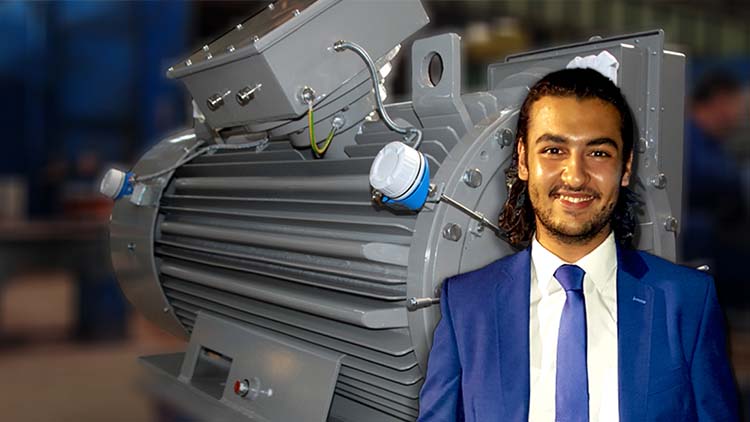Complete Electrical Machines for Electrical Engineering - Level 3
Overview
If you wish to learn about the great importance of transformers, the Complete Electrical Machines for Electrical Engineering – Level 3 course is perfect for you. It is designed to teach you about the importance of DC machine, types and applications of DC motors, and losses in DC machines. There’s a wealth of information provided in this course ranging from magnetic circuits, synchronous generator, operation of induction machines and the power and distribution transformers.
Complete Electrical Machines for Electrical Engineering – Level 3 will demonstrate through step by step instructions on the principles and operation of synchronous motor and generator. Key modules are fully explored in this course ensuring learners gain a complete understanding of the subject.
Complete Electrical Machines for Electrical Engineering – Level 3 will begin at the fundamentals and equip learners with the relevant skills on the overview of synchronous machines salient and non-salient. It is a comprehensive training that offers unique insights on how to be successful both academically and professionally. There is an ever-increasing need for qualified individuals who wish to advance to the next stage of their career! This is a IAP certified course that will demonstrate to leading employers you are continually developing yourself, and will make you a desirable candidate across leading industries.
Why You Should Consider Taking this Course at Study365?
Study365 is a leading online provider for several accrediting bodies, and provides learners the opportunity to take this exclusive IAP course. At Study365, we give our fullest attention to our learners’ needs and ensure they have the necessary information required to proceed with the training.
Learners who register will be given excellent learning support, discounts for future purchases and be eligible for a TOTUM Discount card and Student ID card with amazing offers and access to retail stores, the library, cinemas, gym memberships and their favourite restaurants.
- About the Tutor
- Learning Outcomes
- Who is this Course for?
- Entry Requirements
- Method of Assessment
- Certification
- Awarding Body
- Career Path & Progression

Ahmed Mahdy is an Electrical Power Engineer and the founder of Khadija Academy in 2019. He’s from Cairo, Egypt and is an online instructor for 9 years. He offers electrical engineering courses and regularly posts YouTube videos on electrical engineering. Ahmed has authored 6 books on electrical engineering and has taught close to 40,000 students living in 170 countries. The purpose of his Academy is to teach the fundamentals of electrical engineering from fundamentals to advance levels. He is a highly recognised and successful instructor and often receives 5-star reviews from his students. He has an engaging teaching style and will walk students step by step through complex information.
- Learn the importance of transformers
- Learn about Iron Core
- Learn about conservator in transformers
- Learn why copper is used in Windings
- Learn about different types of transformers
This course is recommended for,
- Anyone interested in learning about transformers, magnetic circuits and electric machines
- Learners should be over the age of 16, and have a basic understanding of English, ICT and numeracy.
- A sound educational background is recommended
This is a knowledge-based course, and thus, will contain no method of assessment.
Upon the successful completion of the course, learners will be awarded an accredited ‘Certificate of Completion’ for ‘Certificate in Electrical Machines for Electrical Engineering – Level 3’ by IAP.
The International Awards for Professionals iAP is an awarding body established in 1999 that aims to promote a high educational standard. They hope to create online education that is trustworthy and credible. They are focused on raising the standards of online education, and ensuring it is accessible to all. The iAP provides accreditation for a range of educational establishments, and monitors and continually develops the educational standards of such institutions. Their globally recognised certifications give learners the opportunity to acquire the skills and knowledge needed to gain employment in the chosen fields.
The Certificate in Complete Electrical Machines for Electrical Engineering - Level 3 will improve your candidature for a number of jobs in the electrical and engineering sectors. You can study further related courses that will open the door to new and exciting opportunities and enhance your expertise in this subject, and add this as a skillset on your resume. Your skills will be recognised by leading employers and top organisations, and for electrical engineering and power engineering students who wish to pursue this field, this certificate will prove to be highly effective.
Course Curriculum
| 1. Course Content | |||
| 1.1. Lesson 1: introduction to electric machines | FREE | 00:03:00 | |
| 1.2. Lesson 2: types of electric machines and principle of electricity generation | FREE | 00:09:00 | |
| 2. DC Machines | |||
| 2.1. Lesson 1: importance and construction of dc machines | FREE | 00:26:00 | |
| 2.2. Lesson 2: armature winding and emf equation | FREE | 00:40:00 | |
| 2.3. Lesson 3: solved example 1 | FREE | 00:05:00 | |
| 2.4. Lesson 4: solved example 2 | FREE | 00:04:00 | |
| 2.5. Lesson 5: solved example 3 | 00:07:00 | ||
| 2.6. Lesson 6: solved example 4 | 00:06:00 | ||
| 2.7. Lesson 7: separately excited dc machine | 00:21:00 | ||
| 2.8. Lesson 8: shunt and series dc machines | 00:25:00 | ||
| 2.9. Lesson 9: solved example 1 on separately excited dc machine | 00:07:00 | ||
| 2.10. Lesson 10: solved example 2 on separately excited dc machine | 00:07:00 | ||
| 2.11. Lesson 11: solved example 3 on shunt generator | 00:04:00 | ||
| 2.12. Lesson 12: solved example 4 on shunt generator | 00:07:00 | ||
| 2.13. Lesson 13: solved example 5 on series dc generator | 00:06:00 | ||
| 2.14. Lesson 14: types and applications of compound dc motors | 00:07:00 | ||
| 2.15. Lesson 15: torque-speed characteristics and speed control of separately excited dc motor | 00:33:00 | ||
| 2.16. Lesson 16: torque-speed characteristics of series dc motor | 00:08:00 | ||
| 2.17. Lesson 17: solved example 1 on speed control | 00:08:00 | ||
| 2.18. Lesson 18: solved example 2 on speed control | 00:06:00 | ||
| 2.19. Lesson 19: starting of dc machine | 00:14:00 | ||
| 2.20. Lesson 20: armature reaction in dc machines | 00:10:00 | ||
| 2.21. Lesson 21: losses in dc machines | 00:04:00 | ||
| 3. Construction of Transformers | |||
| 3.1. Lesson 1: what is a transformer | 00:02:00 | ||
| 3.2. Lesson 2: importance of transformer | 00:04:00 | ||
| 3.3. Lesson 3: iron core of transformer | 00:04:00 | ||
| 3.4. Lesson 4: magnetic circuit inside transformer | 00:05:00 | ||
| 3.5. Lesson 5: windings of transformer | 00:03:00 | ||
| 3.6. Lesson 6: why are windings made of copper | 00:01:00 | ||
| 3.7. Lesson 7: classification of windings | 00:05:00 | ||
| 3.8. Lesson 8: insulating material and transformer oil | 00:02:00 | ||
| 3.9. Lesson 9: conservator of transformer | 00:03:00 | ||
| 3.10. Lesson 10: breather of transformer | 00:04:00 | ||
| 3.11. Lesson 11: bushings of transformer | 00:04:00 | ||
| 3.12. Lesson 12: tap changer of transformer | 00:03:00 | ||
| 3.13. Lesson 13: cooling tubes of transformer | 00:01:00 | ||
| 3.14. Lesson 14: buchholz relay of transformer | 00:02:00 | ||
| 3.15. Lesson 15: explosion vent | 00:02:00 | ||
| 3.16. Lesson 16: methods of cooling | 00:03:00 | ||
| 3.17. Lesson 17: types of transformers | 00:03:00 | ||
| 3.18. Lesson 18: power transformer and distribution transformer | 00:05:00 | ||
| 3.19. Lesson 19: single phase core type transformer | 00:04:00 | ||
| 3.20. Lesson 20: single phase shell type transformer | 00:05:00 | ||
| 3.21. Lesson 21: 3 phase core type | 00:02:00 | ||
| 3.22. Lesson 22: 3 phase shell type | 00:01:00 | ||
| 3.23. Lesson 23: comparison between shell and core csa | 00:01:00 | ||
| 3.24. Lesson 24: comparison between shell and core type | 00:01:00 | ||
| 3.25. Lesson 25: notes | 00:03:00 | ||
| 3.26. Lesson 26: video explaining the components in 3d and real life | 00:05:00 | ||
| 4. Fundamentals of Magnetic Circuits | |||
| 4.1. Lesson 1: introduction to magnetic circuits | 00:02:00 | ||
| 4.2. Lesson 2: induced emf and current | 00:04:00 | ||
| 4.3. Lesson 3: ampere right hand rule | 00:04:00 | ||
| 4.4. Lesson 4: magnetic circuit and important definitions | 00:06:00 | ||
| 4.5. Lesson 5: linear and non linear materials | 00:03:00 | ||
| 4.6. Lesson 6: flux linkage and reluctance | 00:04:00 | ||
| 4.7. Lesson 7: analogy between electric and magnetic circuits | 00:06:00 | ||
| 4.8. Lesson 8: fringing effect | 00:02:00 | ||
| 4.9. Lesson 9: example 1 magnetic circuits | 00:07:00 | ||
| 4.10. Lesson 10: example 2 | 00:03:00 | ||
| 4.11. Lesson 11: example 3 | 00:06:00 | ||
| 4.12. Lesson 12: application on magnetic circuit – transformers | 00:04:00 | ||
| 5. Theoretical Part on Transformers | |||
| 5.1. Lesson 1: introduction to transformers | 00:02:00 | ||
| 5.2. Lesson 2: construction of transformer | 00:02:00 | ||
| 5.3. Lesson 3: theory of operation | 00:04:00 | ||
| 5.4. Lesson 4: ideal transformer | 00:05:00 | ||
| 5.5. Lesson 5: non ideal transformer | 00:02:00 | ||
| 5.6. Lesson 6: effect of loading on transformer | 00:03:00 | ||
| 5.7. Lesson 7: transformer regulation | 00:03:00 | ||
| 5.8. Lesson 8: transformer losses | 00:03:00 | ||
| 5.9. Lesson 9: transformer efficiency | 00:05:00 | ||
| 5.10. Lesson 10: transformer rating | 00:02:00 | ||
| 5.11. Lesson 11: question 1 | 00:01:00 | ||
| 5.12. Lesson 12: question 2 | 00:02:00 | ||
| 5.13. Lesson 13: question 3 | 00:01:00 | ||
| 5.14. Lesson 14: example 1 | 00:01:00 | ||
| 5.15. Lesson 15: voltage relation of transformer | 00:04:00 | ||
| 5.16. Lesson 16: transformer exact equivalent circuit | 00:06:00 | ||
| 5.17. Lesson 17: concept of refereeing | 00:04:00 | ||
| 5.18. Lesson 18: approximate equivalent circuit | 00:02:00 | ||
| 6. Synchronous Machines | |||
| 6.1. Lesson 1: construction and principle of operation of synchronous generator | 00:30:00 | ||
| 6.2. Lesson 2: principle of operation of synchronous motor | 00:24:00 | ||
| 6.3. Lesson 3: equivalent circuit and phasor diagram of non salient synchronous machine | 00:29:00 | ||
| 6.4. Lesson 4: solved example 1 on non salient machine | 00:05:00 | ||
| 6.5. Lesson 5: solved example 2 on non salient machine | 00:11:00 | ||
| 6.6. Lesson 6: solved example 3 on non salient machine | 00:07:00 | ||
| 6.7. Lesson 7: solved example 4 on non salient machine | 00:04:00 | ||
| 6.8. Lesson 8: solved example 5 on non salient machine | 00:07:00 | ||
| 6.9. Lesson 9: solved example 6 on non salient machine | 00:03:00 | ||
| 6.10. Lesson 10: equivalent circuit and phasor diagram of salient synchronous machine. | 00:39:00 | ||
| 6.11. Lesson 11: solved example 1 on salient machine | 00:09:00 | ||
| 6.12. Lesson 12: solved example 2 on salient machine. | 00:05:00 | ||
| 6.13. Lesson 13: solved example 3 on salient machine. | 00:10:00 | ||
| 6.14. Lesson 14: parallel operation of two generators. | 00:17:00 | ||
| 6.15. Lesson 15: synchronization of machine with grid | 00:10:00 | ||
| 7. Induction Machines | |||
| 7.1. Lesson 1: construction and theory of operation of induction machines | 00:27:00 | ||
| 7.2. Lesson 2: equivalent circuit and power flow in induction motor | 00:23:00 | ||
| 7.3. Lesson 3: torque-speed characteristics of induction motor | 00:20:00 | ||
| 7.4. Lesson 4: solved example 1 on induction motor | 00:08:00 | ||
| 7.5. Lesson 5: solved example 2 on induction motor | 00:06:00 | ||
| 7.6. Lesson 6: solved example 3 on induction motor | 00:06:00 | ||
| 7.7. Lesson 7: solved example 4 on induction motor | 00:18:00 | ||
| 7.8. Lesson 8: solved example 5 on induction motor | 00:13:00 | ||
| 7.9. Lesson 9: methods of speed control of induction motor | 00:27:00 | ||
| 7.10. Lesson 10: methods of starting of induction motor | 00:21:00 | ||
| 7.11. Lesson 11: solved example on motor starter | 00:15:00 | ||
| 7.12. Lesson 12: principle of operation of doubly fed induction generator | 00:11:00 | ||
| 7.13. Lesson 13: self excited induction generator | 00:08:00 | ||
| Completion Certificate Request | |||
| Completion Certificate Request | |||






Reed Perry
For this level 3 electrical engineering course, you provided a supportive instructor with wealth of knowledge. I also read his books and found him very engaging.
Frankie Phillips
This course helps you to take a dive into the ocean of electrical and mechanical engineering concepts. Bravo man!
Brook Andrews
I am looking forward to boost my career by choosing Study365. This is my third certification in addition to Goals Mastery and Procrastination Course. I found this beneficial for my career.
Danny Martin
This is the ultimate course to know about the different types of electrical machines that one gets involved in his or her day-to-day lives.